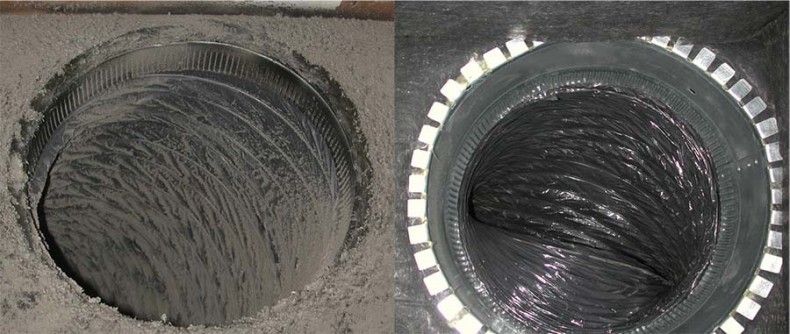When duct cleaning makes sense
Worth the investment or just a scam?
By Hannah McKenzieLeft: A flexible HVAC duct that needs cleaning. Right: A clean flexible HVAC duct.
Q: My neighbor told me about a local company that cleans the inside of the heating and air conditioning ducts. She said it makes the air in the house healthier and also saves energy. Is this worth the investment or just a scam?
A: Sealing your heating, ventilation and air conditioning (HVAC) system’s ducts, as mentioned in last month’s article, often produces noticeable energy savings and may improve indoor air quality. Cleaning your ducts is more of a gamble. Current research doesn’t provide reassurance that duct cleaning will always be a win-win solution because results from cleaning vary a lot. Sometimes the level of contaminants in the indoor air after duct cleaning is higher than before cleaning. In circumstances where ducts have extreme filth, duct cleaning is more likely to be beneficial.
As with all things in life, prevention is the key to avoiding problems.
- Like changing the oil in your car, routine HVAC maintenance is very important. Simple steps like changing HVAC filters, cleaning coils and other components is good for the long-term health of your HVAC system, indoor air quality and pocket book.
- Consider routine inspection of ductwork for cleanliness, especially if some family members are inclined to use air vents as trash receptacles. Sometimes new homes have this problem from construction workers. A vacuum cleaner can normally solve the problem.
- Thorough housekeeping can help reduce irritants and pests — such as pollen, pet dander, dust mites or mice and their waste — and prevent them from taking up residence in your HVAC ductwork.
- Keep contaminants such as a kitty litter box or trash can away from the air return.
- During home improvements, turn off the HVAC system and cover air supply and return vents to prevent construction dust and debris from entering the system.
- If you haven’t yet had your ducts sealed, consider doing it yourself or hire a duct sealing contractor.
Despite our best efforts to keep ducts clean, the National Institutes of Health (NIH) suggests that duct cleaning or duct replacement may be appropriate with the following situations:
- Permanent or persistent water damage in ducts.
- Slime or microbial growth observed in ducts.
- Debris build-up that restricts airflow in ducts.
- Dust being spewed from supply vents.
- Offensive odors originating in ductwork or HVAC components.
Ducts are commonly made of three materials: rigid metal, one to two inches thick fiberglass duct board, or plastic flex duct. Sometimes systems are a combination of the three. In the case of flex duct, it is often more effective to replace it rather than risk damaging it by attempted cleaning. Dirty, wet or moldy fiberglass duct board or fiberglass lined ducts should also be replaced, because trying to clean it can make conditions worse.
When your ducts are made of a cleanable material like rigid metal, select a duct cleaning contractor that is a member in good standing with the National Air Duct Cleaning Association (NADCA). Get quotes from three different companies and check multiple references from each company. Contact NADCA to find contractors in your area. 855-GO-NADCA or nadca.com.
Protect your family during the duct cleaning process by ensuring that duct vents are covered so contaminants aren’t blown into your home. The use of biocides and chemicals is not recommended because even EPA-registered products may pose health risks, including eye, nose and skin irritation. Ideally, have the duct cleaning done while your family is out of the house.
For more information about duct cleaning, contact the National Institutes of Health at (301) 496-3457 or find its Division of Occupational Health and Safety Fact Sheet on HVAC Duct Cleaning by searching “duct cleaning” at www.ors.od.nih.gov
-
Share this story:





Comments (2)
Joven Ruthford |
December 15, 2020 |
reply
Paul Langley |
January 21, 2021 |
reply